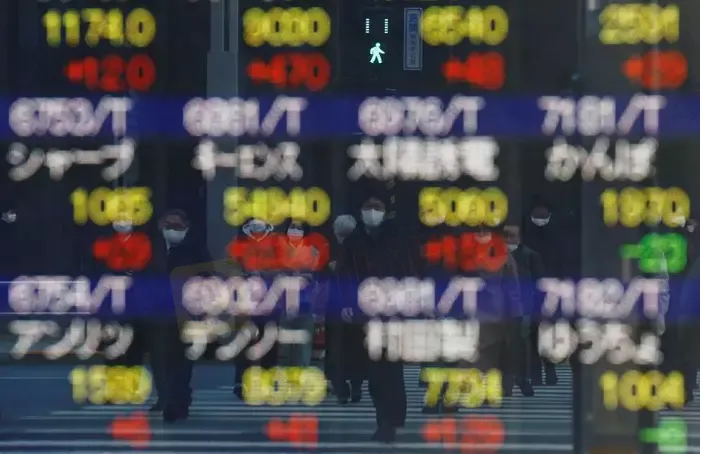简体中文
繁體中文
English
Pусский
日本語
ภาษาไทย
Tiếng Việt
Bahasa Indonesia
Español
हिन्दी
Filippiiniläinen
Français
Deutsch
Português
Türkçe
한국어
العربية
U.S. stocks slip, crude slides as soft data feed recession jitters
Abstract: Asian share markets got off to a slow start on Monday as disappointing Chinese economic data fed doubts last week’s rally on Wall Street could be sustained in the face of determined policy tightening by global central banks.

Wall Street ended a three-day winning streak and crude prices plunged on Monday as economic data from the U.S., Europe and China showed demand weakening under inflation pressures, while the looming possibility of recession curbed risk appetite.
All three major U.S. indexes ended the choppy session modestly lower on the first day of August, on the heels of the S&P 500‘s and the Nasdaq’s largest monthly percentage gains since 2020.
“It‘s a consolidation,” said Chuck Carlson, chief executive officer at Horizon Investment Services in Hammond, Indiana. “Investors are waiting to see if we get follow through or continue it’s downward trend.”
The Institute for Supply Management‘s (ISM) purchasing managers’ index (PMI) showed U.S. factory activity decelerated in July to its lowest level since August 2020, but remained in expansion territory and long-running supply restraints appeared to be easing.
The report follows a swath of data from Europe and Asia that showed factory activity slowing or contracting in the face of dampened global demand and persistent inflation.
“There seems to be a comfort level that economy is slowing but demand isnt going to collapse,” Carlson said. “Is the Fed going to take its foot off the gas pedal and stop raising rates?” That would appear to be what the market is watching.
“It‘s a tug-of-war between those that think the market has already fully discounted the economic slowdown and those that feel it hasn’t,” Carlson added.
The Dow Jones Industrial Average fell 46.73 points, or 0.14%, to 32,798.4, the S&P 500 lost 11.68 points, or 0.28%, to 4,118.61 and the Nasdaq Composite dropped 21.71 points, or 0.18%, to 12,368.98.
The energy sector pulled European stocks lower after disappointing data from the euro zone and China fueled fears of weakening demand and economic contraction.
The pan-European STOXX 600 index lost 0.19% and MSCIs gauge of stocks across the globe gained 0.06%.
Emerging market stocks lost 0.06%. MSCI‘s broadest index of Asia-Pacific shares outside Japan closed 0.11% higher, while Japan’s Nikkei rose 0.69%.
Crude prices headed lower as global factory data weighed on the demand outlook, and as market participants braced for this weeks meeting of OPEC and other oil producers concerning world crude supply.
U.S. crude fell 4.73% to settle at 93.89$ per barrel, and Brent settled at $100.03 per barrel, down 3.94% on the day.
U.S. Treasury yields slid in choppy trading as economic data continued to hint at an impending slowdown which could prompt the Federal Reserve to slow the pace of interest rate increases.
Benchmark 10-year notes last rose 15/32 in price to yield 2.5893%, from 2.642% late on Friday.
The 30-year bond last rose 35/32 in price to yield 2.9206%, from 2.977% late on Friday.
The dollar touched its lowest level against the Japanese yen since June and the dollar index, which measures its performance against a basket of world currencies, was volatile in the wake of the PMI data.
The dollar index fell 0.47%, with the euro up 0.38% to $1.0257.
The Japanese yen strengthened 1.20% against the dollar to 131.64, while sterling was last trading at $1.2255, up 0.73% on the day.
Gold prices edged higher as the dollar softened, as investors looked to economic data for clues regarding the pace of interest rate hikes from the U.S. Federal Reserve.
Spot gold added 0.4% to $1,771.89 an ounce.

Disclaimer:
The views in this article only represent the author's personal views, and do not constitute investment advice on this platform. This platform does not guarantee the accuracy, completeness and timeliness of the information in the article, and will not be liable for any loss caused by the use of or reliance on the information in the article.
Read more

Webull and Others Fined $275,000 for Incomplete Suspicious Activity Reports
Webull Financial, alongside Lightspeed Financial Services Group and Paulson Investment Company, LLC, has agreed to pay a collective fine of $275,000 following an investigation by the US Securities and Exchange Commission (SEC). The penalty was issued due to the firms’ failure to include essential information in suspicious activity reports (SARs) over a four-year period.

Barclays Resolves £40M Fine Over 2008 Fundraising Disclosure Failures
Barclays has reached a settlement with the UK’s Financial Conduct Authority (FCA), agreeing to pay a £40 million fine for failing to adequately disclose arrangements with Qatari investors during its critical fundraising efforts amidst the 2008 financial crisis.

WikiEXPO Global Expert Interview: Advanced Practices and Insights in Financial Regulation
In the midst of rapid advancements and evolving landscapes in financial technology, financial regulation, and ensuring financial security, WikiGlobal stands at the forefront, closely tracking these transformative trends. As we embark on our series of exclusive interviews focusing on these pivotal areas, we are delighted to have had an in-depth conversation with.

Alleged Concerns with TradeEU.global's Trading Practices
An individual trader has come forward with allegations of an unfavourable experience while using the services of the broker TradeEU.global.
WikiFX Broker
Latest News
Saxo & Portuguese Bank Partnership
SEC Fines Broker-Dealers $275K for Incomplete SAR Filings
Elon Musk Warns of Imminent US Bankruptcy | Bitcoin Retreats from $100K
UK FCA Fines Barclays £40 Million Over 2008 Deal
WikiEXPO Global Expert Interview: Advanced Practices and Insights in Financial Regulation
Justin Sun Invests $30M in Trump-Backed World Liberty Financial
Lured by False Promises: Malaysian Driver Lost RM218K to an Investment Scam
FTX Sets March 2025 Timeline for Creditor Payouts: What It Means for Investors
What is an Economic Calendar? How it works
Pros & Cons of Automated Forex Trading
Currency Calculator


